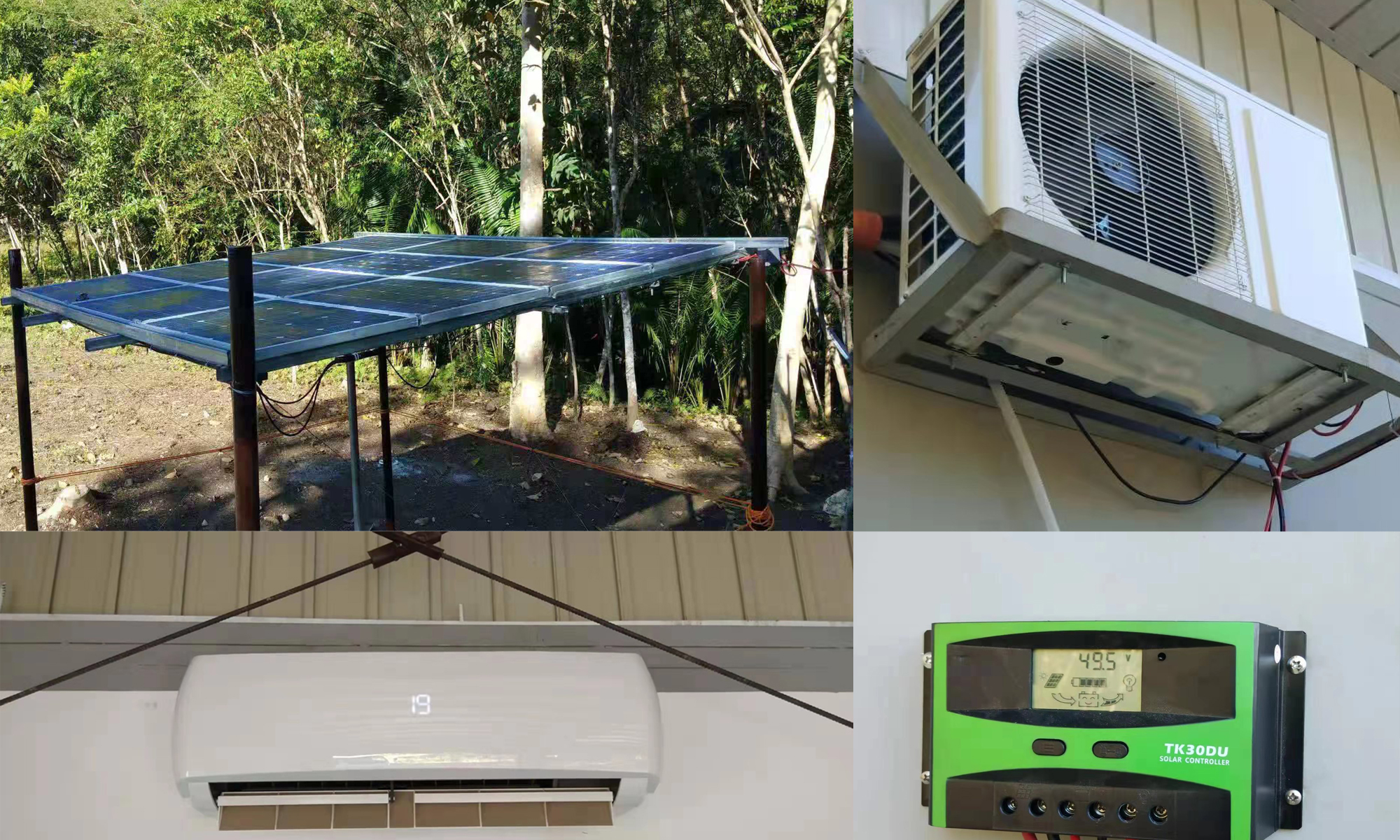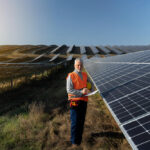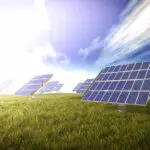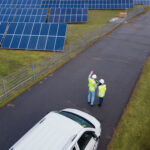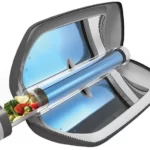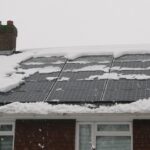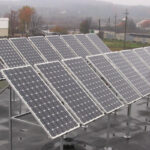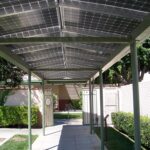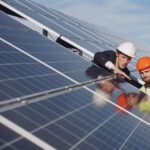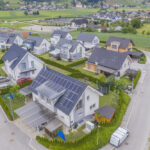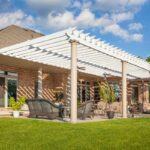When you think about ways to cool down your home during the warmest days of summer, the sun is probably not the first thing that comes to mind. However, our solar system has relied on the sun as its primary source of energy for billions of years.
People have been harnessing the sun’s rays as a source of energy for as long as there have been people.
On a number of different continents, it serves a variety of functions including that of a food source, a source of heat and fire, and others.
But as household solar energy installations continue to shatter records, the sun is playing an increasingly important part in the cooling process. Here is all you need to know about solar air conditioner for home use, whether you’re planning the RV trip of a lifetime or want to make even more use of your current solar panels for home.
What is a Solar Air Conditioner?
Your air conditioner can be powered by the sun if you have what is known as a solar-powered air conditioner, also known as a solar air conditioner or solar AC.
Solar air conditioners operate in the same manner as regular split air conditioners, with the exception that they collect energy from the sun using solar panels rather than drawing it from the electrical grid.
You have the option of purchasing standalone panels for spaces with a smaller floor area, such as your RV, or investing in comprehensive solar-ready systems for your entire property using racking system.
How Does a Solar Air Conditioner Work?
Solar air conditioners make use of both air conditioning and solar power in their operation. To put it more succinctly, it cools your space by utilizing the energy that comes from the Sun to run your air conditioner.
A solar panel is a piece of equipment that converts the energy of the sun into usable form. These solar panels can be mounted on virtually anything, such as your recreational vehicle (RV), a pergola with solar panels installed, or other structures.
It converts the light energy of the sun into usable electrical energy. After that, the energy can either be used straight away or stored in a battery for later use.
Then, using this DC energy either directly or after being converted into AC (via an inverter), a solar-powered air conditioner uses it to heat or cool your home. A solar-powered air conditioner uses the energy of the Sun rather than grid power. But if necessary, it can draw power from the grid.
Photovoltaic (PV) systems or solar thermal systems are the two methods used by solar air conditioners to acquire energy. Solar thermal systems function like solar water heaters, whereas solar PV systems produce electricity using photovoltaic panels.
They use energy of the sun to heat water, which transforms the refrigerant into a heat-absorbing gas that cools the air in your home.
Types of Solar Air Conditioner for Home
You may be asking how to select the best solar-powered air conditioner for your home if you’re prepared to make the transition to clean energy.
It is beneficial to comprehend the various forms of solar technology available before looking at certain products.
Direct current (DC), alternating current (AC), and hybrid solar air conditioners are the three primary categories of solar-powered air conditioners.
Energy flows in two different ways: Direct current (DC) only flows in one direction, but Alternating Current (AC) frequently changes direction. Many different applications employ these currents. Alternating current is used by home energy grids whereas direct current is used by batteries.
Here is how these currents function in AC systems driven by solar energy:
DC Solar Air Conditioners
Photovoltaic solar panels generate DC electricity, which is used by direct current solar air conditioners. These systems are ideal for off-grid applications because they don’t need an inverter to convert the electricity to alternating current.
Pros:
- Directly connected to solar panels
- Ideal for off-grid lifestyle
- Easy to integrate batteries
Cons:
- Need Solar batteries for Storage (extra cost)
- More costly than AC-powered units
AC Solar Air Conditioners
Alternating current solar air conditioners are made to function with the current electrical system in your home.
In other words, the solar panels’ DC current is transformed into AC power for usage with the solar air conditioner, which can be connected to the electrical grid.
Pros:
- More affordable than counterparts
- Connects easily to the grid
Cons:
- Not suitable for off-grid lifestyle
Hybrid Solar Air Conditioners
In order to lower the overall cost of cooling your room or your entire home, hybrid solar air conditioners employ both grid-supplied electricity and solar energy.
In an AC/DC hybrid system, the compressor is powered by solar energy while the fans are powered by grid electricity.
- No need for an inverter
- Easy transition from solar to grid power
- Could be used a heat pump that heats your house
- Can operate in the day or at night
Cons:
- Less possibility to integrate with batteries
- You might need grid at night if the batteries are incompatible
Benefits of Solar Air Conditioner or Home?
The solar panel air conditioners offer a number of benefits. The cost of the initial investment is the sole drawback.
- Boost the Worth of Your Home
Installing an air conditioner that runs off of solar panels has benefits not just for your home’s value but also for the health of the environment. Homes that are equipped with solar air conditioning are in more demand, and as a result, they sell for higher prices.
- Reduce expenses
Using solar-powered air conditioners may still require you to draw electricity from the primary power grid, but the amount of power you use will be cut in half, depending on the conditions in your surroundings.
Consequently, if you power your air conditioner using solar energy, you can drastically cut down on your monthly bills. This helps to offset some of the costly initial installation costs that are associated with the solar panels.
- Reduces the Need for Energy
When conventional air conditioning systems are operating during the hottest days of the summer, they might overload the electrical grid, which can result in power outages.
Solar air conditioners are especially helpful since they lower demand during times of peak usage by redirecting load away from the primary grid. This makes solar air conditioners one of the most useful types of renewable energy technologies. This may result in a reduction in the number of brownouts and blackouts that occur inside the electrical system. .
- Zero emissions of greenhouse gasses
Because solar energy is a non-depletable resource, using solar-powered air conditioners reduces one’s dependency on non-renewable fossil fuels. As a direct consequence of this, there will be a reduction in the production of greenhouse gas emissions, which are a contributor to the warming of the planet.
What’s the Solar Air Conditioner Price
The cost of installing a solar air conditioner can range anywhere from $1,600 to $13,000, but the usual cost for a homeowner in the United States is approximately $3,400.
Keep in mind that you may be eligible for a tax credit of up to 26% if you use renewable energy in 2022.
It is anticipated that this will fall to 22% in 2023 before coming to an end in 2024.
Price Analysis of Solar-Powered Air Conditioners
You may estimate how much you will spend on your brand-new solar air conditioner by looking at the cost breakdown of each component of the system, such as the following:
The price of a solar air conditioner ranges from $1,000 and $2,700 on average.
- Each photovoltaic panel ranges in price from $250 to $350.
- Wiring costs between $50 and $200.
- Batteries around $2,001–3,500
- $750-$1,700 for an inverter
- Chargers can cost anything from $50 to $400
- Installation costs range from $1,500 to $3,500
Are Solar Air Conditioners For Home Really Effective?
It’s possible that hearing that solar-powered air conditioning units function just as well as their conventional counterparts would surprise you.
As long as there is enough sunlight, a solar air conditioning system is just as effective at cooling an interior room as an electric-powered one is (which will typically be the case because the system is only likely to be in use on a hot, sunny day anyway).
In the extremely unlikely event that you need to use the air conditioning on a cloudy day, the solar air conditioner system will use the battery array as a backup power source.
When it is very sunny, the solar panels collect more power than usual, which is then used to charge the array’s storage batteries.
Factors To consider While Switching to Solar Air Conditioner for Home
The following are some things to take into account while selecting a solar-powered air conditioner for your home.
1. Environmental Factors
In regions with longer summers and more sunlight throughout the year, the number of solar panels that will be required will be significantly reduced.
If, on the other hand, you live in an area where there is less light, you will need a larger backup battery and a greater number of solar panels in order to collect the energy that the sun provides.
2. Your home’s size
If your home is large, you will require a more powerful air conditioner in order to adequately cool the entire space.
As a result, the number of solar panels you need will increase in proportion to the size of your property.
It typically takes between ten and twenty solar panels to meet the energy needs of a typical home’s collection of electrical devices.
3. Battery
If you live in an area where there is minimal natural light, purchasing batteries is the better option. If you want to completely cut yourself off from the power grid, using batteries to store solar energy so you can use it at night and on cloudy days is an excellent alternative for you to consider.
Frequently Asked Questions
How Much Does a Solar Air Conditioner Cost?
The cost of a solar air conditioner for a home can range from $1,600 to $13,000, but the average homeowner pays approximately $3,400 for one depending upon their needs.
Can You Run an Air Conditioner on Solar Power?
Any solar PV system must be designed and sized properly, but when using solar power to run your air conditioner, you must have enough energy on hand to last through the hottest days of the year.
Are Solar Air Conditioners Any Good?
If you want cooler air, you will obtain cooler air thanks to solar air conditioners, which operate exactly like traditional versions.
The truth is that solar air conditioners perform equally well to conventional ones and can lower a homeowner’s cooling energy costs in half, as well as the environment’s normal cost for cooling our houses.
How Many Solar Panels are Needed to Run a House with AC?
Assuming an irradiation of four peak sun hours each day, an air conditioner would need solar panels with a power output of 1200 watts for each shed load of cooling capacity it possessed.
It is recommended to use a battery with 100Ah capacity for every tonne of weight and every hour that the operation is expected to last.
This will allow operation even when there is a low amount of irradiance, and it will also provide a reservoir for surge current in the motor.
Conclusion
Your home’s requirement for energy, the environment where you live, your budget, and whether or not your house is solar system-optimized will all determine whether or not investing in one of the finest solar air conditioners for homes is worthwhile.
The finest locations for solar air conditioning are those that experience extreme heat & humidity and so need a Solar AC. It could be preferable to perform a house-wide if your home is well-suited for a full solar energy system.
If you don’t, a solar air conditioner could still be a smart choice for renewable energy in your house

